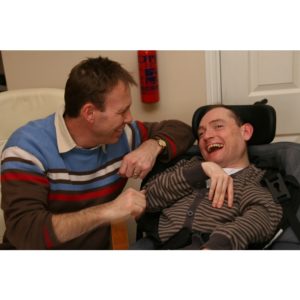Reflections on working in Learning Disability Services
Dr Ruth Berry blogs about her career in Learning Disability Services

I’ve worked with people with a learning disability for more than 25 years. For me, the challenges and rewards remain the same and are fundamentally about relationships and values. The resonances with the broader culture are so strong right now as all disadvantaged people fight for the right to be treated as equals.
People with a learning disability really struggle in this fight because it is so hard for them to articulate their position and to be heard. This is especially true for those who have more severe levels of intellectual impairment and additional needs. These are the people whose needs are especially complex and difficult to meet, often resulting in a downward spiral that can result in admission to hospital. Many people outside of Learning Disability Services will have heard of one such hospital, Winterbourne View, and the horrendous events there, involving the patients being treated in humiliating and degrading ways. It’s no exaggeration to say that these people were tortured by the staff being paid to care for them. Long reports have been written about the many factors that fed into this abusive situation. For me, a key issue is the dehumanisation of people who are experienced as ‘difficult’ and ‘other’. Once this ‘othering’ has happened, poor and even abusive treatment is legitimised. If we are to resist this pull, we need to be mindful of this tendency to split into groups of ‘them’ and ‘us’ and find ways to remain connected to those people who may, on the surface, feel quite different to us. We have to find ways of remaining curious and manage our anxieties in the face of things that feel unusual and therefore threatening.

Graham and Anthony
I have spent my career trying to find ways to connect with people who can be difficult to reach. I have been lucky to have some brilliant teachers in this, including Graham Firth (Intensive Interaction Project Co-ordinator) who is due to retire this month. I recommend reading his blogs and Facebook updates as well as his formal publications as he has a wonderful enthusiasm for making connections and for overcoming barriers: his latest adventures during re-deployment have involved learning about how to engage in full PPE and he shared a heart-warming story with me last week of how a socially isolated gentleman sought him out for interaction after weeks of Graham simply making himself available. I have also spoken to many hundreds of frontline staff across many organisations and I am repeatedly struck by how hard many staff work to deliver outstandingly compassionate care, often under incredibly challenging circumstances. I have recently been in conversation with our Assessment and Treatment Unit (ATU) staff and despite multiple barriers (including a rapid move from their base in response to Covid-19 impact, facing potential closure of their unit as part of regional plans to deliver more consistent care across the Integrated Care System), their desire to deliver person-centred care felt so strong. Their dedication to keep ‘cracking on’ and to advocate for the service users in their care was striking. We shouldn’t underestimate the fundamental importance of remaining compassionate in highly challenging circumstances and this is something we can all strive for and support each other in.
Covid-19 is amplifying all the tensions, divisions and differentials in privilege that have always existed. The difference now is that they are front and centre and call for us to engage with them, however uncomfortable that might be. Working with people with a learning disability raises deeply uncomfortable feelings about difference and disability (to name just two) and prompts us to reflect on how we can relate in ways that are respectful and genuine. If there is one maxim to underpin this way of relating it’s to see the person first, not get caught up on the superficial and surface differences. I take hope from knowing there are staff in our organisation who do this day in, day out and can teach us all to keep on reaching out in a curious and compassionate way and to keep trying to do our best for those who are most in need.
Dr Ruth Berry is a Consultant Clinical Psychologist and Professional Lead for the Learning Disability Psychology Team.